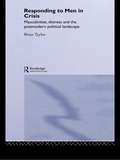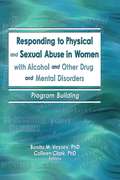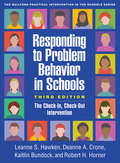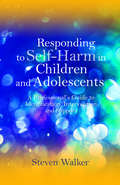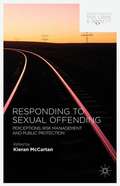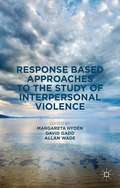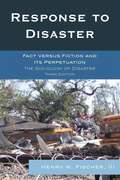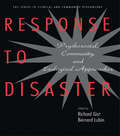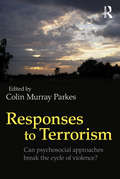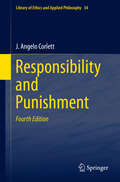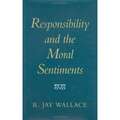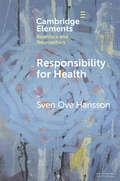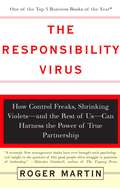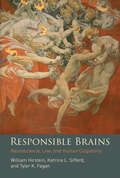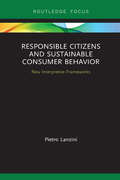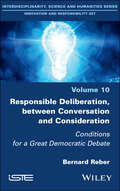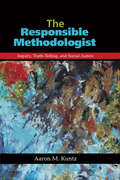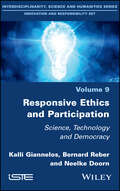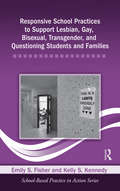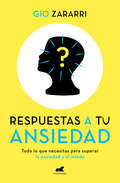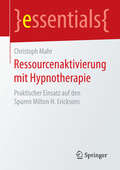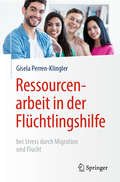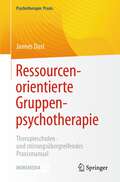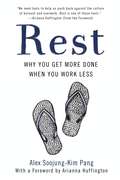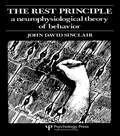- Table View
- List View
Responding to Men in Crisis: Masculinities, Distress And The Postmodern Political Landscape
by Brian TaylorResponding to Men in Crisis is based on new research looking at gendered assumptions about rationality and men's mental health. It looks at postmodern theory in relation to masculinities and madness, and discusses key contemporary debates in political uses of risk, dangerousness and so on. The author relates this to a discussion of current policy and practice responses to men within the mental health system. It offers the reader a theoretical exploration of a topically and politically sensitive issues and is relevant to service user involvement and survivor movements, making it essential reading for academics and students of sociology and allied disciplines.
Responding to Physical and Sexual Abuse in Women with Alcohol and Other Drug and Mental Disorders: Program Building
by Bonita Veysey Colleen ClarkLearn from the experiences of these program sites to develop better services for women with co-occurring disorders and histories of violenceThis book explores the efforts of the Women, Co-Occurring Disorders and Violence Study to address the significant lack of appropriate services for women trauma survivors with co-occurring mental health and substance use disorders. Experts describe the services integration programs of nine participating sites that address the multiple needs of these women. In this guide, you will find useful strategies for integrating services that are responsive to the strengths and needs of the individual as well as the community.This vital resource examines how-over a period of five years-sites designed, implemented, and evaluated their interventions. You will learn how sites developed their strategies for integrating services at both the clinical/individual level and at the services or systems level. The book also shows how trauma-informed, gender-specific, culturally competent care fosters treatment that is sensitive to related issues such as children and parenting, interpreting culture cues, and socioeconomic difficulties. In Responding to Physical and Sexual Abuse in Women with Alcohol and Other Drug and Mental Disorders, you will learn about the details of nine different programs, including: Franklin County Women&’s Research Project-a collaborative project for rural women, designed and operated by local consumer/survivor/recovering women (CSRs) The Triad Women&’s Project-a semi-rural comprehensive system of care to respond to the needs of women and children The Women Embracing Life and Living (WELL) Project-interventions include trauma, parenting, systems integration and mutual help groups withIntegrated Care Facilitators providing resource coordination and advocacyservices PROTOTYPES, Centers for Innovation in Health, Mental Health, and Social Services-the three levels of integration the Systems Change Center implemented the Boston Health Commission-an integrated model of trauma-informed services culturally and linguistically appropriate for its service population of primarily poor Latina and African American women Palladia&’s Portal Project-a comprehensive trauma-informed intervention designed to put trauma and safety first to assist women remaining in treatment Arapahoe House&’s New Directions for Families-a family-oriented intervention for women and their dependent children Allies-comprehensive, integrated services for women as well as intervention for their children, ages 5-10The District of Columbia Trauma Collaboration Study (DCTCS)-a two-phase project addressing the needs of dually diagnosed women trauma survivors Responding to Physical and Sexual Abuse in Women with Alcohol and Other Drug and Mental Disorders provides you with first-hand accounts of the process by which programs and service systems were transformed. As challenges were met and strategy was adapted to "real world" situations, the sites discussed in this text found new and improved methods for helping this unique group of women. The book offers tips, solutions, and possibilities to mental health professionals, substance abuse professionals, and domestic violence professionals, and even patients and/or clients searching for support.
Responding to Problem Behavior in Schools, Third Edition: The Check-In, Check-Out Intervention (The Guilford Practical Intervention in the Schools Series)
by Leanne S. Hawken Deanne A. Crone Kaitlin Bundock Robert H. HornerNow revised and expanded with the latest research and adaptations for additional target behaviors, this is the gold-standard guide to Check-In, Check-Out (CICO), the most widely implemented Tier 2 behavior intervention. CICO is designed for the approximately 10–15% of students who fail to meet schoolwide behavioral expectations but who do not require intensive, individualized supports. In a large-size format for easy photocopying, the book includes step-by-step procedures and reproducible tools for planning and implementation. At the companion website, purchasers can download and print the reproducible tools and can access online-only training materials, sample daily progress reports, and an Excel database for managing daily data. (Second edition subtitle: The Behavior Education Program.) New to This Edition *Chapters on CICO in alternative educational settings and for students with internalizing behavior problems. *Content on using CICO for attendance issues, academic and organizational skills, and recess behavior problems. *Chapter on layering additional targeted interventions onto CICO. *Chapter with specific recommendations for training and coaching school teams. *Expanded chapters on frequently asked questions, implementation in high school, and culturally responsive practices. *Supplemental online-only training and data management tools. *Updated throughout with current data and evidence-based procedures. See also Dr. Hawken's training DVD, Check-In, Check-Out, Second Edition: A Tier 2 Intervention for Students at Risk. Also available: the authors' work on intensive interventions for severe problem behavior, Building Positive Behavior Support Systems in Schools, Second Edition: Functional Behavioral Assessment. This book is in The Guilford Practical Intervention in the Schools Series, edited by Sandra M. Chafouleas.
Responding to Self-Harm in Children and Adolescents
by Steven WalkerSelf-harm is a growing problem in children and young people but it can be hard to understand and difficult to recognise. Responding to Self-Harm in Children and Adolescents will help professionals to understand self-harm and respond appropriately. It covers what the risk factors are, including social exclusion, and who is most likely to self-harm. Information on what self-harm is and what causes it, including mental health issues, problems in childhood and trauma, is included. The book also covers how to recognise self-harm and how to immediately respond in an emergency, and different intervention methods are explored. Finally, the author discusses means of support, including how parents and friends can help. This accessible guide provides clear and easily digestible information and practical advice to any professional working with a child or young person who is suspected of, or actually self-harming.
Responding to Sexual Offending
by Kieran MccartanThis collection brings together international contributors from multiple disciplines to discuss the current public, social and governmental understandings and responses to sexual violence. Exploring issues such as how to manage sex offenders, the volume provides recommendations for how to reduce offending and improve community engagement.
Response Based Approaches to the Study of Interpersonal Violence
by David Gadd Allan Wade Margareta HydénInterpersonal violence has been the focus of research within the social sciences for some considerable time. Yet inquiries about the causes of interpersonal violence and the effects on the victims have dominated the field of research and clinical practice. Central to the contributions in this volume is the idea that interpersonal violence is a social action embedded in responses from various actors. These include actions, words and behaviour from friends and family, ordinary citizens, social workers and criminal justice professionals. These responses, as the contributors to this volume all show, make a difference in terms of how violence is understood, resisted and come to terms with in its immediate aftermath and over the longer term. Bringing together an international network of scholars and practitioners from a range of disciplines and fields of practice, this book maps and expands research on interpersonal violence. In doing so, it opens an important new terrain on which social responses to violence can be fully interrogated in terms of their intentions, meanings and outcomes.
Response to Disaster: The Sociology of Disaster
by Henry W. FischerResponse to Disaster combines the original research of author Henry W. Fischer, III with the literature used today to describe behavioral and organizational challenges commonly experienced before, during, and after disasters. Actual problems are presented and compared to those often misperceived to occur, known as disaster mythology. Fischer examines case studies conducted during the post-impact and long-term recovery periods of major and minor disasters worldwide. He asserts that the role of the mass media assists in eliciting needed help with an effective response, but also perpetuates disaster mythology. Fischer presents striking comparisons between the perception of disaster in the eyes of the general public, the actual situations emergency responders face, and the way mass media reporters broadcast information. Additionally, the problems encountered by emergency response organizations are compared and contrasted with general public and media perceptions of disaster response. Fischer presents the response to September 11, 2001, the south Asian tsunami, and Hurricane Katrina in this comprehensive third edition.
Response to Disaster: Psychosocial, Community, and Ecological Approaches
by Bernard Lubin Richard GistFirst published in 2000. Routledge is an imprint of Taylor & Francis, an informa company.
Responses to Terrorism: Can psychosocial approaches break the cycle of violence?
by Colin Murray ParkesWhy do responses to terrorist attacks often perpetuate cycles of deadly violence? Can an understanding of the psychology of these cycles help us to break them? Drawing on clinical experience of the care of people and communities affected by violence and disasters and on advances in cognitive and dynamic psychology, attachment theory, group psychology and thanatology, this ground-breaking work by a prominent and varied array of contributors casts light on the causes of terrorism, the reasons why responses to deadly attacks easily give rise to or maintain cycles of violence and some ways to prevent and interrupt these cycles. Using the violence in Northern Ireland and Rwanda as case studies throughout, Part 1, The Context of Terrorism, looks at the psychological and social influences behind extremism, terrorism and conflict. Part 2, Reponses to a Terrorist Attack, examines the responses that can feed a cycle of violence and assesses a range of approaches for their success in ending violence. Part 3, Breaking the Cycle, looks in depth at specific environments, influences and changes that can affect how violence can be prevented or mitigated, including the role of schools and the media and an examination of how peace processes were carried out in Northern Ireland and Rwanda. The book works to demonstrate how psychological responses to a terror attack can trigger unstable emotional responses and override judgement and to identify the five key points in a cycle of violence where change, for better or for worse, is possible. Ideal for psychiatrists, thanatologists, palliative care and bereavement staff, politicians and journalists as well as anyone with an interest in terrorism and its causes, this is a thought-provoking and accessible work on a highly topical subject.
Responsibility and Punishment
by J. Angelo CorlettThis volume provides discussions of both the concept of responsibility and of punishment, and of both individual and collective responsibility. It provides in-depth Socratic and Kantian bases for a new version of retributivism, and defends that version against the main criticisms that have been raised against retributivism in general. It includes chapters on criminal recidivism and capital punishment, as well as one on forgiveness, apology and punishment that is congruent with the basic precepts of the new retributivism defended therein. Finally, chapters on corporate responsibility and punishment are included, with a closing chapter on holding the U. S. accountable for its most recent invasion and occupation of Iraq. The book is well-focused but also presents the widest ranging set of topics of any book of its kind as it demonstrates how the concepts of responsibility and punishment apply to some of the most important problems of our time. "This is one of the best books on punishment, and the Fourth Edition continues its tradition of excellence. The book connects punishment importantly to moral responsibility and desert, and it is comprehensive in its scope, both addressing abstract, theoretical issues and applied issues as well. The topics treated include collective responsibility, apology, forgiveness, capital punishment, and war crimes. Highly recommended. "--John Martin Fischer, Distinguished Professor of Philosophy, University of California, Riverside.
Responsibility and the Moral Sentiments
by R. Jay WallaceWe need to understand what we are doing when we hold people morally responsible, a stance that Wallace connects with a central class of moral sentiments, those of resentment, indignation and guilt. To hold someone responsible, he argues, is to be subject to these reactive emotions in one's dealings with that person. Developing this theme, he offers an interpretation of the reactive emotions and traces their role in our practices of blame and moral sanction.
Responsibility for Health (Elements in Bioethics and Neuroethics)
by Sven Ove HanssonThis Element offers a broad perspective on responsibility for health. This includes responsibilities in the prevention of disease and accidents, and in the creation of healthcare for all. The professional responsibilities of physicians and nurses are explored, and so are the responsibilities that we all have for our own health. Many of the central problems in healthcare ethics are discussed from a responsibility perspective, for instance paternalism, informed consent, evidence-based medicine, alternative medicine, and the use of artificial intelligence in healthcare. In order to perform this analysis, conceptual tools for responsibility analysis are provided, such as the distinction between blame responsibility and task responsibility and various notions of causality that are relevant for our understanding of responsibility.
The Responsibility Virus
by Roger L. MartinA Triumph. Few management books have ever brought such psychological insight to the question of why good people often struggle in positions of leadership. -Malcolm Gladwell, author of "The Tipping Point"
Responsible Brains: Neuroscience, Law, and Human Culpability
by William Hirstein Katrina L. Sifferd Tyler K. FaganAn examination of the relationship between the brain and culpability that offers a comprehensive neuroscientific theory of human responsibility. When we praise, blame, punish, or reward people for their actions, we are holding them responsible for what they have done. Common sense tells us that what makes human beings responsible has to do with their minds and, in particular, the relationship between their minds and their actions. Yet the empirical connection is not necessarily obvious. The “guilty mind” is a core concept of criminal law, but if a defendant on trial for murder were found to have serious brain damage, which brain parts or processes would have to be damaged for him to be considered not responsible, or less responsible, for the crime? What mental illnesses would justify legal pleas of insanity? In Responsible Brains, philosophers William Hirstein, Katrina Sifferd, and Tyler Fagan examine recent developments in neuroscience that point to neural mechanisms of responsibility. Drawing on this research, they argue that evidence from neuroscience and cognitive science can illuminate and inform the nature of responsibility and agency. They go on to offer a novel and comprehensive neuroscientific theory of human responsibility. The authors' core hypothesis is that responsibility is grounded in the brain's prefrontal executive processes, which enable us to make plans, shift attention, inhibit actions, and more. The authors develop the executive theory of responsibility and discuss its implications for criminal law. Their theory neatly bridges the folk-psychological concepts of the law and neuroscientific findings.
Responsible Citizens and Sustainable Consumer Behavior: New Interpretive Frameworks (Routledge-SCORAI Studies in Sustainable Consumption)
by Pietro LanziniThere is broad consensus on the need to shift to a new paradigm of lifestyles and economic development, given the un-sustainability of current patterns. Given this, research on consumer behavior is to play a crucial role in shedding light on the motives underpinning the adoption of responsible behaviors. Stemming from a thorough discussion of existing approaches, this book argues that the perspective of analysis has to be modified. First, acknowledging that a profile of the responsible consumer does not exist since all of us can be more or less sustainable and environment-friendly: the sustainability of an individual should not be considered as given, being something dynamic that changes according to both subjective and contextual factors. Moreover, the book hypothesises that integrating dimensions and perspectives that have been so far overlooked by mainstream research will help deconstruct responsible behaviors adopting a flexible and holistic approach. Relevant policy implications are discussed, and empirical research on responsible behaviors is illustrated. This book will be of great interest to students and scholars of consumer behavior, sustainable consumption, environmental psychology and environmental studies in general.
Responsible Deliberation, between Conversation and Consideration: Conditions for a Great Democratic Debate
by Bernard ReberCommunication is a crucial issue in our complex societies tinted by distrust. It is the core of democratic life and almost all human and social actions. Therefore it is essential for communication to be responsible. But responsible communication cannot only be conceived as a deontological issue, framed by ethical compliance requirements or good practices promotion. It should be considered with all the virtualities of communication, from conversation to consideration, going through narrative, interpretation and argumentation. Indeed each of these communicational capacities has its properties, assets, complementarities and limitations. They constitute different ways to be responsive. This book offers a contribution to the debate of Theory of Deliberative Theory (TDD), reexamined here within its different inspiration sources, notably the opposition between communicational turn and system, the fact of moral pluralism and the public reason.
The Responsible Methodologist: Inquiry, Truth-Telling, and Social Justice
by Aaron M KuntzWhat does it mean to be a responsible methodologist? Certainly it is more than being a research middle-manager who ensures that the tools used in a thesis or dissertation are of the right gauge. In The Responsible Methodologist, leading education scholar Aaron Kuntz uses the latest movements in social theory to challenge qualitative researchers to reconceptualize their work away from the technocratic toward an intervention, an ethical disruption of the norm, an activist stance toward progressive social change. Inviting creativity and vision, he insists that the responsible methodologist become a force leading the discourse toward social justice. His book-challenges the technocratic role given to qualitative methodologists in university settings;-urges them to become a force for change through Foucault's parrhesia, risky truth-telling;-includes research projects that have incorporated this vision.
Responsive Ethics and Participation: Science, Technology and Democracy
by Kalli Giannelos Bernard Reber Neelke DoornTaking stock of the overall confused picture that research and innovation (R&I) literature and practices offer with regard to citizen and stakeholder participation, this book provides a methodical conceptual and an empirical analysis to determine the connection between ethics and participation. Strong theoretical pillars in the fields of ethics, politics and responsible research and innovation (RRI) form the backbone of this critical approach to participation, which considers new approaches to democratic participation. Taking into account a number of participatory processes, Responsive Ethics and Participation establishes a new methodology to differentiate, classify and understand the added value of the participation of citizens and stakeholders in R&I.Participation could be considered the epitome of innovation ethics. However, its multidimensionality, its ethical and theoretical grounds and the nature of the involvement and related outcomes must be clarified at the outset, in order to reach active forms of participation. Ethical participation is required for reliable developments in science and technology, which is what this book ultimately demonstrates.
Responsive School Practices to Support Lesbian, Gay, Bisexual, Transgender, and Questioning Students and Families (School-Based Practice in Action)
by Emily S. Fisher Kelly S. KennedyThe needs and rights of lesbian, gay, bisexual, transgender, and questioning (LGBTQ) students and families are often ignored, generally misunderstood, and only rarely given priority by the school system. This book provides a practical and useful guide for school-based mental health professionals to support students, families, teachers, and administrators in the development of a safe, inclusive school environment for all LGBTQ students and families. It begins with an overview of the unique issues and challenges faced by LGBTQ students and families, including a discussion of sexuality and gender identity development within the interconnected contexts of home, school, and community. Practical steps are given for creating an inclusive school environment; implementing prevention and intervention techniques to address discrimination, bullying, and violence; and organizing effective counseling programs for LGBTQ students. These school-based efforts are then extended to working with families and communities to reinforce steps taken in the school context. An accompanying CD includes numerous handouts, sample letters, and other resources to assist the school-based mental health professional in implementing responsive and affirmative practices for LGBTQ students and families.
Respuestas a tu ansiedad: Todo lo que necesitas para superar la ansiedad y el miedo
by Gio Zararri¿Sientes que las preocupaciones dominan tu vida? ¿No consigues entender qué te ocurre y todo ello aumenta tus miedos y tu ansiedad? Sé por lo que estás pasando, y también sé que si no respondes con calma a tus miedos, nada cambiará. En este libro encontrarás la respuesta a todas esas preocupaciones que complican tu vida o la de un ser querido. Te ayudará a comprender lo que estás sintiendo y cuál es la realidad de tu ansiedad, una verdad con la que entenderás que no tienes nada que temer, sino mucho que aprender. Este libro puede convertirse en tu mejor aliado contra la ansiedad, la mejor herramienta tanto si la sufres tú como si deseas ayudar a un hijo, a tu pareja o a un familiar o amigo que padece este trastorno. Gracias a Respuestas a tu ansiedad, pronto podrás responder, con calma y objetividad, a las muchas preocupaciones que genera este trastorno y que te llevan a sentir verdadero pánico. No esperes más para cambiar tu vida o la de un ser querido. No existe mejor momento para conseguirlo que ahora. Utiliza estas respuestas como el mejor remedio para eliminar esos miedos irracionales y sin sentido que acompañan tu vida.
Ressourcenaktivierung mit Hypnotherapie: Praktischer Einsatz auf den Spuren Milton H. Ericksons (essentials)
by Christoph MahrChristoph Mahr vermittelt einen umfassenden Überblick über Ressourcen und deren Bedeutung für die Psychotherapie. Er erläutert, wie wichtig eine ressourcenorientierte Grundhaltung insbesondere bei hypnotherapeutischen Prozessen ist, welche Ressourcen zur Verfügung stehen und wie sich diese im Rahmen der Therapie nutzen lassen. Das Essential enthält einen theoretischen Teil, in welchem unter anderem die moderne Hypnose mit ihrer Leitfigur Milton H. Erickson und die von ihm abgeleiteten Methoden vorgestellt werden, sowie einen praktischen Teil mit strukturierten und detailliert beschriebenen Handlungsanleitungen zur Aktivierung von Ressourcen.
Ressourcenarbeit in der Flüchtlingshilfe: bei Stress durch Migration und Flucht
by Gisela Perren-KlinglerErzwungene Migration und Flucht bedeuten oft eine große Verunsicherung oder sogar Traumatisierung der Betroffenen. Nach Ankunft im Gastland gilt es, die disruptiven Erfahrungen zu bewältigen, um eine gute Integration und möglichst selbständiges Leben aufbauen oder nach Rückkehr ins Heimatland an das frühere Leben anknüpfen zu können. Die hier dargestellten Vorgehensweisen basieren auf der Grundannahme, dass Menschen über ausreichende Ressourcen verfügen, um auch nach potenziell traumatischen Erlebnissen gut weiterzuleben und zu wachsen; es gilt, diese spezifischen Ressourcen wiederzuentdecken, zu nutzen und zu stärken. Das Buch bietet einfach aufbereitetes Grundlagenwissen rund um die Themen exzessiver Stress und seine Konsequenzen, Trauma und Verlusterlebnisse. Zahlreiche einfache Strategien und Techniken werden aufgezeigt, wie betroffene Menschen unter Anleitung Ressourcen aktivieren können, um diese Herausforderungen zu meistern. Das Buch richtet sich an alle Berufsgruppen, die im psychosozialen Dienst in der Flüchtlingshilfe aktiv sind. Es kann sogar dazu benützt werden, um mit Flüchtlingen zusammen eine Ausbildung als Mediatoren und Mediatorinnen für ihre Landsleute in die Wege zu leiten.
Ressourcenorientierte Gruppenpsychotherapie: Therapieschulen- und störungsübergreifendes Praxismanual (Psychotherapie: Praxis)
by Jannes DustDieses Buch soll Ihnen im Rahmen einer Kompetenzorientierung alles an die Hand geben, was Sie für die Leitung einer ressourcenorientierten Gruppenpsychotherapie in der ambulanten und/oder stationären Behandlung brauchen. Anhand von konkreten Praxisanleitungen, zahlreichen Beispielen und übersichtlichem Arbeitsmaterial unterstützt Sie dieses Manual von der Vorbereitung über die Durchführung bis zur letzten Gruppensitzung. Es soll Ihnen Unsicherheiten nehmen, Sie auf schwierige Situationen in der Gruppe vorbereiten und Sie in der Findung Ihrer therapeutischen Haltung stärken. Aus dem Inhalt: Selbstheilungskräfte – Selbstfürsorge – Versorgung von Bedürfnissen – Ressourcenaktivierung – Selbstwertgefühl und Selbstwirksamkeit. Über den Autor:Jannes Dust, M.Sc. Psychologe, Psychologischer Psychotherapeut. Erfahrung in unterschiedlichen psychiatrischen Einrichtungen, mit Schwerpunkt Gruppenpsychotherapie. Niedergelassen in eigener Praxis in Bonn. Arbeitsschwerpunkte: Ressourcenorientierte Therapie, Gruppenpsychotherapie, Verhaltenstherapie, Strukturpathologie, Abhängigkeitserkrankungen und außergewöhnliche Erfahrungen.
Rest: Why You Get More Done When You Work Less
by Alex Soojung-Kim Pang"Rest is such a valuable book. If work is our national religion, Pang is the philosopher reintegrating our bifurcated selves."---Arianna Huffington, New York Times Book Review Overwork is the new normal. Rest is something to do when the important things are done—but they are never done. Looking at different forms of rest, from sleep to vacation, Silicon Valley futurist and business consultant Alex Soojung-Kim Pang dispels the myth that the harder we work the better the outcome. He combines rigorous scientific research with a rich array of examples of writers, painters, and thinkers—from Darwin to Stephen King—to challenge our tendency to see work and relaxation as antithetical. "Deliberate rest," as Pang calls it, is the true key to productivity, and will give us more energy, sharper ideas, and a better life. Rest offers a roadmap to rediscovering the importance of rest in our lives, and a convincing argument that we need to relax more if we actually want to get more done.
The Rest Principle: A Neurophysiological Theory of Behavior
by J. D. Sinclair John David SinclairFirst published in 1982. Routledge is an imprint of Taylor & Francis, an informa company.
